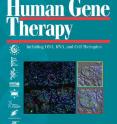Caffeine energizes cells, boosting virus production for gene therapy applications
Give caffeine to cells engineered to produce viruses used for gene therapy and the cells can generate 3- to 8-times more virus, according to a paper published in Human Gene Therapy, a peer-reviewed journal published by Mary Ann Liebert, Inc. (www.liebertpub.com). The paper is available free online at www.liebertpub.com/hum This simple and inexpensive strategy for increasing lentivirus production was developed by Brian Ellis, Patrick Ryan Potts, and Matthew Porteus, University of Texas Southwestern Medical Center, Dallas. In their paper, "Creating Higher Titer Lentivirus with Caffeine," they emphasize that the timing of caffeine addition to standard lentiviral production protocols is important for achieving higher virus titers. Caffeine concentration is also critical, as too much caffeine was toxic to the cells and did not increase virus production.
Lentivirus vectors are commonly used for transferring genes into cells for both research applications in the laboratory and, increasingly, for gene therapy procedures in clinical testing. The addition of caffeine "should significantly decrease the cost of lentiviral production for research and clinical uses," conclude the authors.
"It is ironic that the ingredient in beverages like colas and coffees that helps keep us awake and alert is also useful in jazzing up cells to produce more gene therapy vectors. An increase in vector production of 5-fold may prove critical in establishing the commercial viability of lentiviral based products," says James M. Wilson, MD, PhD, Editor-in-Chief, and Director of the Gene Therapy Program, Department of Pathology and Laboratory Medicine, University of Pennsylvania School of Medicine, Philadelphia.
Source: Mary Ann Liebert, Inc./Genetic Engineering News
Articles on the same topic
- New anti-HIV gene therapy makes T-cells resistant to HIV infectionWed, 26 Jan 2011, 16:35:27 UTC
Other sources
- Caffeine 'jazzes' engineered cellsfrom UPIFri, 28 Jan 2011, 4:00:17 UTC
- New anti-HIV gene therapy makes T-cells resistant to HIV infectionfrom PhysorgWed, 26 Jan 2011, 16:31:34 UTC
- Caffeine energizes cells, boosting virus production for gene therapy applicationsfrom Science DailyTue, 25 Jan 2011, 22:30:09 UTC
- Caffeine energizes cells, boosting virus production for gene therapy applicationsfrom Science BlogTue, 25 Jan 2011, 21:30:31 UTC
- Caffeine energizes cells, boosting virus production for gene therapy applicationsfrom PhysorgTue, 25 Jan 2011, 21:00:18 UTC
